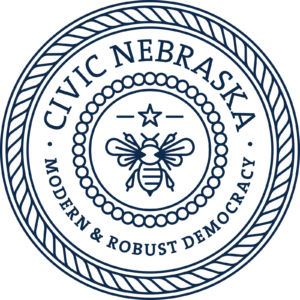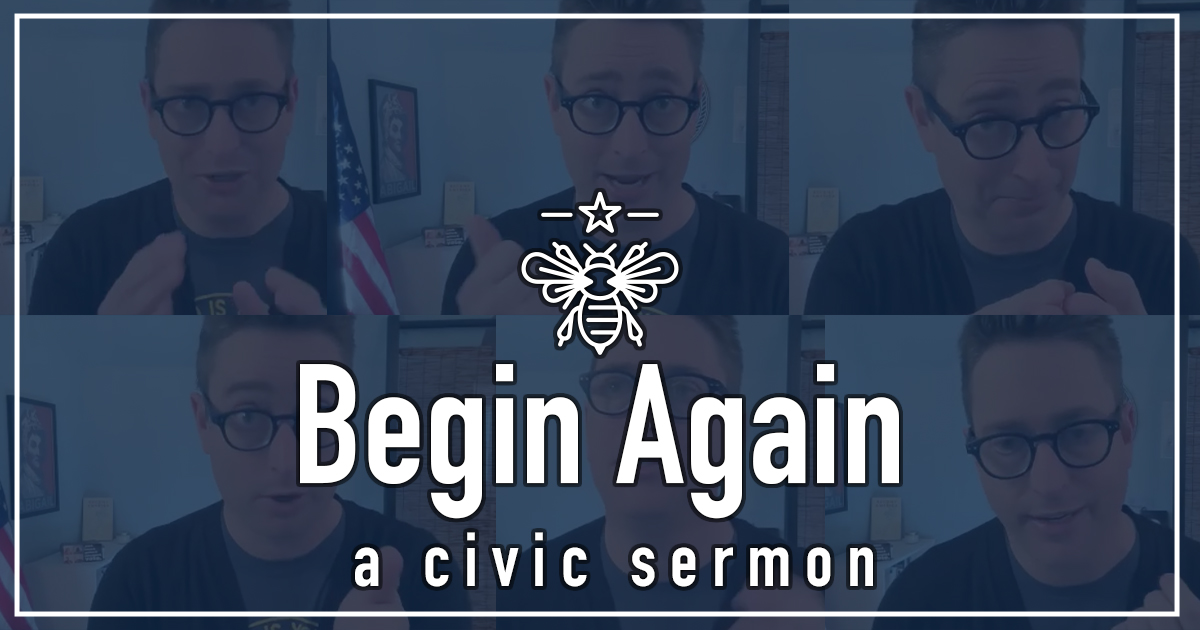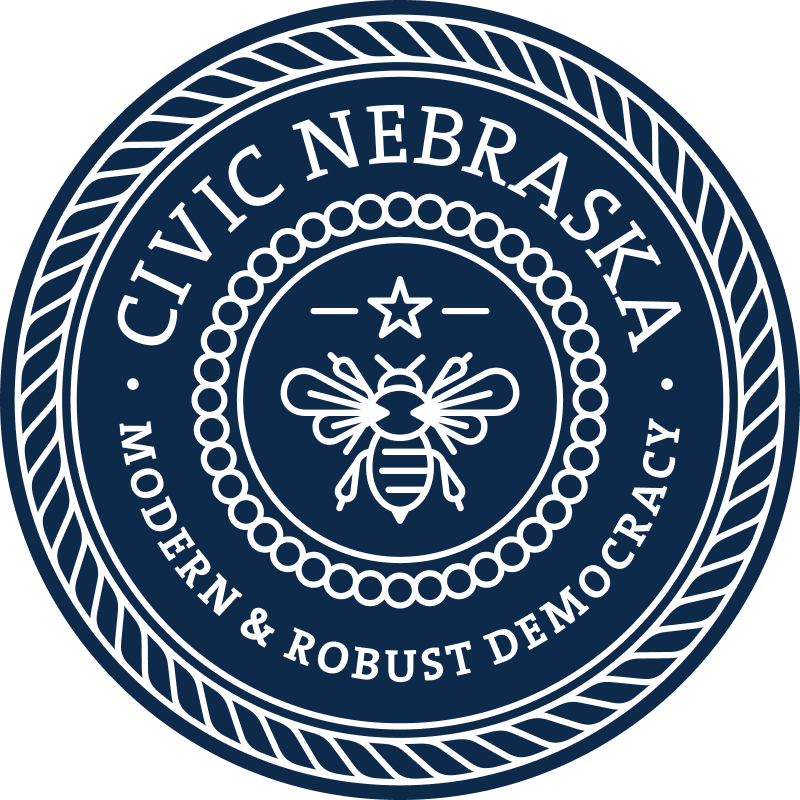On March 26, 2022, Civic Nebraska convened its ninth Civic Saturday gathering. Steve Smith, Civic Nebraska’s director of communications and a 2020-21 national Civic Saturday Fellow, delivered the following “civic sermon.” To watch the entire gathering, click here.

Here we are at the turning of another season, and starting our annual stretch toward the sun. Feels good. Let’s celebrate the fact that our days are now officially more light than dark, and that the Earth – or at least, our part of it – is coming back to life.
 Not surprisingly, we have a lot of new beginnings around this time. Spring cleaning. The start of baseball season. Planting and gardening. Heck, I’ll even throw in the Red-White Spring Game this year – because man, if anything needs a hard reboot, it’s that bunch over at Memorial Stadium.
Not surprisingly, we have a lot of new beginnings around this time. Spring cleaning. The start of baseball season. Planting and gardening. Heck, I’ll even throw in the Red-White Spring Game this year – because man, if anything needs a hard reboot, it’s that bunch over at Memorial Stadium.
It’s also been said that we Americans embody the optimism that this season brings. And, we do have a unique American capacity for newness. Of looking forward without sentimentality. In many ways, we do seem to value the possibility of something new over old attachments.
What’s funny is that this attitude is relatively new, at least in the long story of humanity. The innate belief that things can and should be better just isn’t the way civilizations have worked over the eons. The concept of human progress goes back only to the Enlightenment. For thousands of years before that, most societies assumed that the good times were over. And any development or growth was behind them.
Kinda depressing, huh?
Regardless, this is a powerful legacy to overcome. Even our optimistic American mindsets can’t fully escape it. Some would even say this cynicism is starting to win. We feel this today, don’t we? There’s no shortage of unease about the changing state of our country, about the breathless speed of disruption we’re all experiencing … technological, cultural, social. You get a real sense this grand experiment of ours is approaching another very big moment.
It’s in the air. And we’re all wondering which way things are going to break.
There are the dueling narratives: We’re either emerging from a pandemic with a roaring economy and a meaningful opportunity to put it to work for everyone, at peace for the first time in twenty years, reaching toward something new. Or, we’re stuck in a disaffected loop of disease and recession and isolation, of malaise and unrest, fighting a new Cold War that is pushing prices up and pulling our social fabric apart.
Which is it?
Not to be flip, but the answer is yes. Nothing is so clear-cut. And of course, we know this. America, for want of a better word, is messy. Today, as we peek around the corner at what’s next, we should remind ourselves of this. That throughout our story, we’ve rebooted ourselves over and over – and each time, we’ve summoned something great. But at the same time, it’s never been simple.
So today, I’d like to go back to the very beginning. To that amazing time at and around the Founding, to learn what truly made America, America in those days.
Then, let’s talk about a time often called the “Second Founding.” Another amazing time between Civil War and Reconstruction, to learn what re-made America in those days. And last, if we really are on the precipice of something big and new, then let’s think what that ‘Third Founding’ might be.
Our First Founding.
We know the story: Taxation Without Representation, We Hold These Truths to Be Self-Evident, Valley Forge, Yorktown, the Constitutional Convention, We The People.
 There’s your speed history of the Founding. But this really gives short shrift to the extraordinary start of our story, and how different it was from how the world worked back then. Those 11 years between Declaration and Constitution were a golden age of reason. This golden age of reason didn’t just drop out of the sky. When the colonists finally declared independence, they’d already spent years wrestling with big, moral questions: What is our guiding virtue? Is our cause rooted in justice? Is this the right thing to do?
There’s your speed history of the Founding. But this really gives short shrift to the extraordinary start of our story, and how different it was from how the world worked back then. Those 11 years between Declaration and Constitution were a golden age of reason. This golden age of reason didn’t just drop out of the sky. When the colonists finally declared independence, they’d already spent years wrestling with big, moral questions: What is our guiding virtue? Is our cause rooted in justice? Is this the right thing to do?
Every July 4, the bangs and booms of our fireworks might echo the armed struggle to free ourselves militarily from Britain’s grasp. But if we were actually being true to the Spirit of ’76, we’d read, think, and debate. I don’t know how well that would go at a barbecue, but I’d be willing to give it a try. The Continental Congress put themselves through all the paces so that by the time they got to the point of declaring independence, the intellectual and moral foundations of a new nation had been carefully built.
This nation was built on civic virtue – personal devotion to the success of the whole. Simply put, a moral society requires good citizens, who live more for one another than for their own interests. So when the break was made, the signers all swore to it, even pledging their lives, fortunes, and sacred honor to one another.
But our history is messy. Over the next decade, we became the United States of America in spite of – or, at least not only because of – those mythic heroes we learned about in our history books. George Washington was an objectively mediocre military tactician. He was prone to indecision and fits of anger. He saw his best general turn traitor. Midway through the war, he barely dodged a plot among his own officers to decapitate his command and take over themselves.
The Continental Congress wasn’t exactly an inspiring group of philosopher-kings, either. A few years in, it was broke, corrupt, and dysfunctional. Any civic leader worth his salt was back in his home state, helping to run their respective state governments. That much-ballyhooed “Spirit of ’76” had dwindled away. Most days the national Congress couldn’t even form a quorum, much less govern.
Guess who it fell to, then. Yes, to the people. Up and down the continent, they took it upon themselves to form and then hold together the new nation. From farm to town to city, early Americans set aside personal interests and regional rivalries for what became known as The Common Cause.
Esther Reed is a good example of this. Does anyone remember Esther? During the war, she rallied American women to donate their time, talent, and treasure to The Common Cause. She started the Ladies’ Association of Philadelphia, and they banged on doors across the city, they raised money to buy fabric, and then they sewed clothes for the Continental Army. She made sure every volunteer seamstress embroidered their names into the clothes they sent to soldiers. Kind of an early USO, I suppose.
At the time, she wrote: “If opinion and manners did not forbid us women to march to glory by the same paths as men, we should at least equal and sometimes surpass them in our love for the public good.”
Love for the public good. Civic love. It wasn’t just who we were fighting against. It was what we were fighting for.
So this is how we began. A powerful commitment to civic virtue helped create our unique republic, our never-done-before republic, and – yes – our extremely flawed republic.
Because our history is messy. And for all the talk of the common good and civic morals in early America, our national story is still quite difficult to resolve at this point. The liberty-loving people who claimed all men were free and equal? Well, they made some pretty big exceptions, didn’t they. And they set out to expand their free republic on the backs of enslaved people.
It took four-score and – what, ten more years? – for America to even begin to reckon with that.
So now we come to The Second Founding.
Secession. Emancipation. Gettysburg. Appomattox. John Wilkes Booth. Reconstruction.
 Ah, and the Reconstruction Amendments. Thirteen, Fourteen, and Fifteen. Their arrival finally affirmed the Declaration’s call for equality. Equal protection under the law. Equal right to vote. The right to count as an equal American.
Ah, and the Reconstruction Amendments. Thirteen, Fourteen, and Fifteen. Their arrival finally affirmed the Declaration’s call for equality. Equal protection under the law. Equal right to vote. The right to count as an equal American.
To paraphrase President Lincoln, it was a new birth of freedom. A violent birth, but nonetheless.
And, it’s altogether proper to focus on Lincoln when talking about this time – a period when our great state came into being, of course. Sitting here in our state’s capital city named in his honor, it’s hard to escape his legacy. I mean, he saved the Union.
But Lincoln also gave America an enduring civic religion. To reunite the country, he leaned into that civic virtue that had been unleashed by the Declaration. He called for devotion to the Union. Devotion to rule by Constitution and the law, not by men, and certainly not demagogues. Devotion to the unifying bonds of democratic citizenship. Devotion to our national purpose.
Devotion. That’s another way of saying love, I suppose. Civic love.
But our history is messy. We won the war but lost the peace. Assassination, a new president with Southern sympathies, the stoking of regional hatreds, the rise of Jim Crow … We came out of the Civil War hoping to build a utopia of equality. We got something else instead. We know this because we’re still arguing over so many of the same issues today: voting rights, immigration, true equality.
The Second Founding is still unfinished. There’s still a lot of work to do.
Let’s finish by talking about that work. About what can be next.
Today, we’ve talked about two extraordinary chapters of our story. Both involved consequential wars on our own soil. One that came about because American democracy was inevitable, the other because American democracy failed.
I’d like to stipulate that these times are not those times. And we shouldn’t assume that another cataclysmic armed conflict is most certainly coming. In fact, I’d wager that it won’t even come close to that. I’m a firm believer in cooler heads continuing to prevail.
But the relative peace we enjoy today doesn’t mean that we’re at peace. Disaster has many children, and today we find ourselves amid any number of subtler, slow-rolling crises. Climate trouble. Income inequality. Creeping authoritarianism in our states.
As I said, it’s in the air. But nothing is preordained, and it would be our mistake to look at what’s already happened as some kind of magic wayfinder for what’s about to occur. Our history is messy, and our future will be, too.
But from today’s examples, I think we can assume a couple of things.
One is the power of civic virtue – the idea of fighting for the common good. Remember, this is deep in our American DNA. It’s old, and it’s true. If you are American, you have civic virtue deep within you. And the day is coming when we all will need to summon it in a new Common Cause. Some say that day is already here.
Another is the fact that yeah, you can change the Constitution to create more equal arrangements of power within our society. But changing as a people is much more difficult. Even in a fast-forward world, individuals still change slowly, which is why our history is messy. I understand why some of us look at the world today, and say, OK, we’ve gone enough. No more change.
But change is coming. It’s the one constant in the universe. Einstein, who was no stranger to the laws of physics, once said that No problem can be solved from the same consciousness that created it. This should ring in our ears today. It should make us ask the hard questions as we contemplate what’s next.
What if, instead of laws designed to bring back an era that never actually existed in this country, we unleash the power of people to innovate? To act on behalf of our highest national principles?
What if, when considering big projects, whether it’s legislation or a shared national goal, we set aside the toxic pragmatism of what we call “political reality?” What if we defined “realistic” as it was originally intended to be defined: Within our capacity to do?
And what if we were to not just see America as it is – but how America could really be? As the first truly multicultural, truly multi-ethnic, truly pluralistic republic in the history of the world?
Think about that. By the most amazing turn of fate, a tiny slice of all the matter in the universe came together to create us all, so we could be here right now. For the briefest moment in the great span of human history, all of us have this privilege to exist together, at this time to embark on something never, ever done before.
What an awesome opportunity. We can’t waste it.
I don’t know, maybe a lot of it will look familiar: Our institutions and processes, still imperfect but rebuilt for modern complexity. Our public square – peaceful, robust, networked, inclusive, and rendering discourse at the speed of light. Citizens firmly asserting their individual rights, but also, deeply affirming their responsibilities in an ever-interconnected, ever-interdependent world.
And yeah, all the while, we can ask those big moral questions that have been with us since the beginning: What is our guiding virtue? Is our cause rooted in justice? Is this the right thing to do?
So, here we are at the turning of another season – at a time of rebirth and renewal – and we are setting out to begin America, again. An America that is bolder, and freer, and more just, and – yes – more loving than the version we’re leaving behind.
That’s the cause. That’s the work.
So, to paraphrase Lincoln again, let us strive on to finish the work we are in.
Or, in this case, to begin it.
Thank you.



